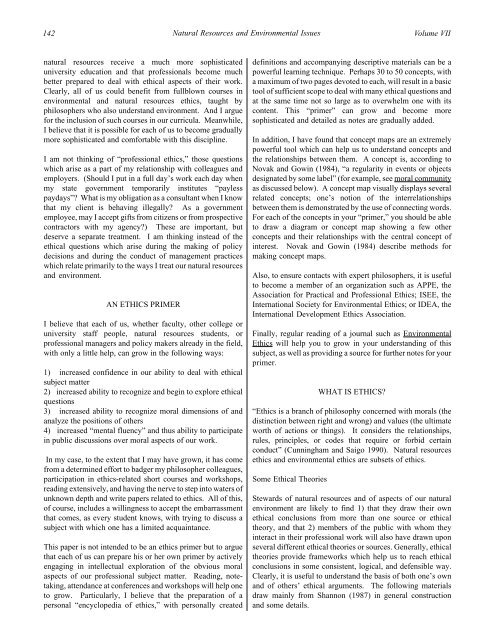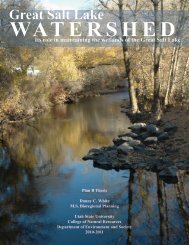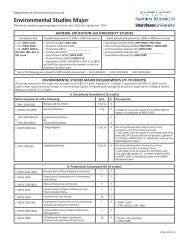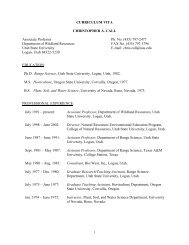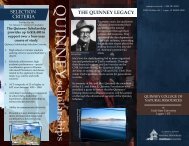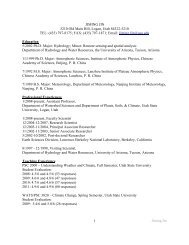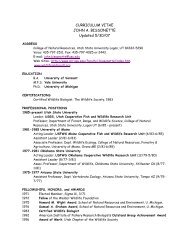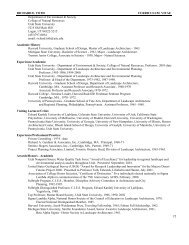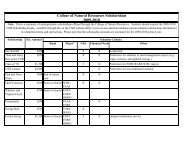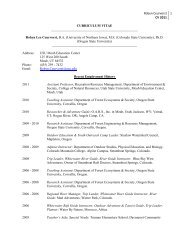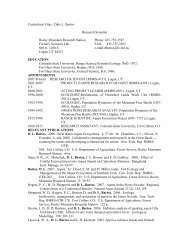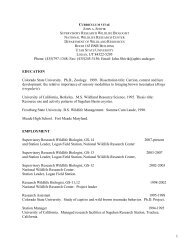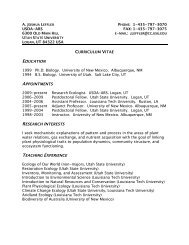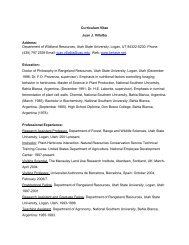University Education in Natural Resources - CNR Home - Utah State ...
University Education in Natural Resources - CNR Home - Utah State ...
University Education in Natural Resources - CNR Home - Utah State ...
Create successful ePaper yourself
Turn your PDF publications into a flip-book with our unique Google optimized e-Paper software.
142 <strong>Natural</strong> <strong>Resources</strong> and Environmental Issues Volume VII<br />
natural resources receive a much more sophisticated<br />
university education and that professionals become much<br />
better prepared to deal with ethical aspects of their work.<br />
Clearly, all of us could benefit from fullblown courses <strong>in</strong><br />
environmental and natural resources ethics, taught by<br />
philosophers who also understand environment. And I argue<br />
for the <strong>in</strong>clusion of such courses <strong>in</strong> our curricula. Meanwhile,<br />
I believe that it is possible for each of us to become gradually<br />
more sophisticated and comfortable with this discipl<strong>in</strong>e.<br />
I am not th<strong>in</strong>k<strong>in</strong>g of “professional ethics,” those questions<br />
which arise as a part of my relationship with colleagues and<br />
employers. (Should I put <strong>in</strong> a full day’s work each day when<br />
my state government temporarily <strong>in</strong>stitutes “payless<br />
paydays”? What is my obligation as a consultant when I know<br />
that my client is behav<strong>in</strong>g illegally? As a government<br />
employee, may I accept gifts from citizens or from prospective<br />
contractors with my agency?) These are important, but<br />
deserve a separate treatment. I am th<strong>in</strong>k<strong>in</strong>g <strong>in</strong>stead of the<br />
ethical questions which arise dur<strong>in</strong>g the mak<strong>in</strong>g of policy<br />
decisions and dur<strong>in</strong>g the conduct of management practices<br />
which relate primarily to the ways I treat our natural resources<br />
and environment.<br />
AN ETHICS PRIMER<br />
I believe that each of us, whether faculty, other college or<br />
university staff people, natural resources students, or<br />
professional managers and policy makers already <strong>in</strong> the field,<br />
with only a little help, can grow <strong>in</strong> the follow<strong>in</strong>g ways:<br />
1) <strong>in</strong>creased confidence <strong>in</strong> our ability to deal with ethical<br />
subject matter<br />
2) <strong>in</strong>creased ability to recognize and beg<strong>in</strong> to explore ethical<br />
questions<br />
3) <strong>in</strong>creased ability to recognize moral dimensions of and<br />
analyze the positions of others<br />
4) <strong>in</strong>creased “mental fluency” and thus ability to participate<br />
<strong>in</strong> public discussions over moral aspects of our work.<br />
In my case, to the extent that I may have grown, it has come<br />
from a determ<strong>in</strong>ed effort to badger my philosopher colleagues,<br />
participation <strong>in</strong> ethics-related short courses and workshops,<br />
read<strong>in</strong>g extensively, and hav<strong>in</strong>g the nerve to step <strong>in</strong>to waters of<br />
unknown depth and write papers related to ethics. All of this,<br />
of course, <strong>in</strong>cludes a will<strong>in</strong>gness to accept the embarrassment<br />
that comes, as every student knows, with try<strong>in</strong>g to discuss a<br />
subject with which one has a limited acqua<strong>in</strong>tance.<br />
This paper is not <strong>in</strong>tended to be an ethics primer but to argue<br />
that each of us can prepare his or her own primer by actively<br />
engag<strong>in</strong>g <strong>in</strong> <strong>in</strong>tellectual exploration of the obvious moral<br />
aspects of our professional subject matter. Read<strong>in</strong>g, notetak<strong>in</strong>g,<br />
attendance at conferences and workshops will help one<br />
to grow. Particularly, I believe that the preparation of a<br />
personal “encyclopedia of ethics,” with personally created<br />
def<strong>in</strong>itions and accompany<strong>in</strong>g descriptive materials can be a<br />
powerful learn<strong>in</strong>g technique. Perhaps 30 to 50 concepts, with<br />
a maximum of two pages devoted to each, will result <strong>in</strong> a basic<br />
tool of sufficient scope to deal with many ethical questions and<br />
at the same time not so large as to overwhelm one with its<br />
content. This “primer” can grow and become more<br />
sophisticated and detailed as notes are gradually added.<br />
In addition, I have found that concept maps are an extremely<br />
powerful tool which can help us to understand concepts and<br />
the relationships between them. A concept is, accord<strong>in</strong>g to<br />
Novak and Gow<strong>in</strong> (1984), “a regularity <strong>in</strong> events or objects<br />
designated by some label” (for example, see moral community<br />
as discussed below). A concept map visually displays several<br />
related concepts; one’s notion of the <strong>in</strong>terrelationships<br />
between them is demonstrated by the use of connect<strong>in</strong>g words.<br />
For each of the concepts <strong>in</strong> your “primer,” you should be able<br />
to draw a diagram or concept map show<strong>in</strong>g a few other<br />
concepts and their relationships with the central concept of<br />
<strong>in</strong>terest. Novak and Gow<strong>in</strong> (1984) describe methods for<br />
mak<strong>in</strong>g concept maps.<br />
Also, to ensure contacts with expert philosophers, it is useful<br />
to become a member of an organization such as APPE, the<br />
Association for Practical and Professional Ethics; ISEE, the<br />
International Society for Environmental Ethics; or IDEA, the<br />
International Development Ethics Association.<br />
F<strong>in</strong>ally, regular read<strong>in</strong>g of a journal such as Environmental<br />
Ethics will help you to grow <strong>in</strong> your understand<strong>in</strong>g of this<br />
subject, as well as provid<strong>in</strong>g a source for further notes for your<br />
primer.<br />
WHAT IS ETHICS?<br />
“Ethics is a branch of philosophy concerned with morals (the<br />
dist<strong>in</strong>ction between right and wrong) and values (the ultimate<br />
worth of actions or th<strong>in</strong>gs). It considers the relationships,<br />
rules, pr<strong>in</strong>ciples, or codes that require or forbid certa<strong>in</strong><br />
conduct” (Cunn<strong>in</strong>gham and Saigo 1990). <strong>Natural</strong> resources<br />
ethics and environmental ethics are subsets of ethics.<br />
Some Ethical Theories<br />
Stewards of natural resources and of aspects of our natural<br />
environment are likely to f<strong>in</strong>d 1) that they draw their own<br />
ethical conclusions from more than one source or ethical<br />
theory, and that 2) members of the public with whom they<br />
<strong>in</strong>teract <strong>in</strong> their professional work will also have drawn upon<br />
several different ethical theories or sources. Generally, ethical<br />
theories provide frameworks which help us to reach ethical<br />
conclusions <strong>in</strong> some consistent, logical, and defensible way.<br />
Clearly, it is useful to understand the basis of both one’s own<br />
and of others’ ethical arguments. The follow<strong>in</strong>g materials<br />
draw ma<strong>in</strong>ly from Shannon (1987) <strong>in</strong> general construction<br />
and some details.


